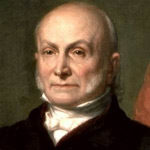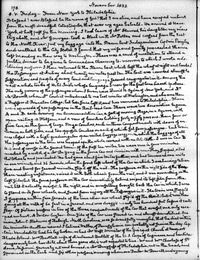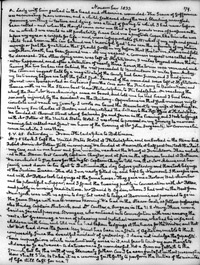One hundred eighty-eight years ago, on November 8, 1833, the first recorded deadly passenger train accident took place on the Camden & Amboy Railroad. Only two months had elapsed since the line replaced horses with steam locomotives. The mishap took place between Hightstown and Spotswood (in Cranbury aka Cranberry twp.), New Jersey, on its way from South Amboy to Bordentown. Two people were killed, one immediately, and another dying later. On board were Congressman and former U.S. President John Quincy Adams, as well as Cornelius Vanderbilt. Vanderbilt’s leg was broken.

 Adams recorded the event in his diary, describing the accident as “the most dreadful catastrophe that ever my eyes beheld.” I transcribed the two pages from Adam’s journal, as I could find no transcriptions anywhere online. They tell the story in a graphic and emotional method that can’t be expressed in mere laying out of the historical facts. The original diaries are held by the Massachusetts Historical Society. They have been digitized, and I have included links to the two relevant pages.
Adams recorded the event in his diary, describing the accident as “the most dreadful catastrophe that ever my eyes beheld.” I transcribed the two pages from Adam’s journal, as I could find no transcriptions anywhere online. They tell the story in a graphic and emotional method that can’t be expressed in mere laying out of the historical facts. The original diaries are held by the Massachusetts Historical Society. They have been digitized, and I have included links to the two relevant pages.
Irish Actor Tyron Power was also on board and chronicled the episode in his two-volume journal titled Impressions in America. I’ve included a link to his transcribed memories of the incident below. Vanderbilt vowed never to travel by train again, although he eventually became a railway magnate and owned the New York Central Railroad, as well as others.

So, what happened? It seems that a journal box overheated. In early days of railroading, railroad trucks weren’t built using roller bearings. Axle bearings were housed in a box that used oil-soaked rags or cotton packing to reduce the friction of the axle against the truck frame. If the oil leaked or dried out, the axle bearings would overheat. This created a “hot box.” Not long before the accident, the crew had stopped the train “to oil the wheels.” But it had only gone a short distance when the journal box overheated, and caught fire, this even though the train that had been traveling at 35 mph had slowed to 20 mph after the servicing of the bearings. The journal box fire caused an axle on one of the carriages to break, leading to the immediate derailment and overturning of the carriage. Of the 24 passengers in the carriage, all but 1 was injured.

Transcription of John Quincy Adams’ Journal 39, pages 178 and 179
I have added a few punctuation marks to make the transcription more legible. Click on the diary illustrations to see the pages at the Massachusetts Historical Society website.
P 178
8.v. Friday – From New York to Philadelphia
Blessed! Ever Blessed be the name of God! That I am alive, and have escaped unhurt from the most dreadful catastrophe that ever my eyes beheld. We arrived at New York at half past six this morning… I then returned to the Steamboat, which left the wharf at eight and landed the Passengers at Amboy about twenty minutes past ten…
Adams then begins writing about the rail journey and mishap…
 Adams Diary 39, Page 178
Adams Diary 39, Page 178
There were upwards of 200 passengers in the Railroad cars. There were two Locomotive Engines. A and B each drawing an Accommodation car, a sort of moving Stage, in a square, with open railing – a Platform and a row of benches holding forty or fifty persons – then four or five cars, in the form of large Stage Coaches, each in three compartments with doors of entrance on both sides, and two opposite benches on each of which sat four passengers. Each train was closed with a high quadrangular open railed baggage wagon, in which the baggage of all the passengers in the train was heaped upon; the whole covered with an oil cloth. I was in car B [ ] and of course in the second train. Of the first ten miles, two were run in four minutes. Marked by a watch of a Mr. Da Yong in the same car and division with me. They stopped, oiled the wheels and proceeded. We had gone about five miles further, and had traversed one mile in one minute and 36 seconds, when the front left wheel of the car in which I was, having taken fire and burnt for several minutes, slipped off the rail – The pressure on the right side of the car then meeting resistance, raised it with both wheels from the rail and it was oversetting on the left side; but the same pressure on the car immediately behind, raised its left side from the rails till it actually overset, to the right, and in oversetting brought back the car in which I was, to stand on its four wheels and saved from injury all the passengers in it. The train was stopped I suppose within five seconds of the time when our wheels slipped off the rail; but it was then going at the rate of 60 feet in a second and was dragged nearly two hundred feet before it could stop. Of sixteen persons in two of the three compartments of the car that overset, one only escaped unhurt – a Doctor Guysar (sp?). One side of the car was stoved in and almost demolished. One man, John C. Stedman of Raleigh, North Carolina, was so dreadfully mangled, that he died within 10 minutes. Another man named I believe Walters (sp?) of Pennsylvania can probably not survive the day. Captain Vanderbilt had his leg broken, as had Mr. West , Minister of the Episcopal Church at Newport Rhode Island. Mrs. Bartlett, wife of Lieutenant Bartlett of the 21st Corps of Engineers and her sister dangerously hurt. Her child about three years old, is not expected to live. Mr. and Mrs. Charlass of St. Louis, Missouri gravely cut and bruised, a Mr. Dreyfuss of Philadelphia, cut in the head, and sprained in the back and six other persons, among whom are Doctor McDowell, and a young
Adam’s Diary Page 179
 Adams Diary 39, Page 179
Adams Diary 39, Page 179
8 – lady with him gashed in the head and otherwise wounded. The scene of sufferance was excruciating, men, women, and a child, scattered along the road, bleeding , mangled, groaning, writhing in torture and dying was a trial of feeling to which I had never before been called – and when the thought came over me that a few seconds more of pressure on the car in which I was would in all probability have laid me a prostrate corpse, like him who was before my eyes, or a cripple for life – and more insupportable still – what if my wife and grandchild had been in the car behind me! Merciful God! How can the infirmity of my nature express or feel the gratitude that should swell in my bosom that this torture, a thousandfold worse than death, has been spared me. At my request a coroner’s inquest was called upon the deceased. The other dying man was left at Hightstown, three miles beyond where the disaster happened, and after a duration of nearly three hours, the train was resumed and leaving two broken cars behind, the rest proceeded to Bordentown, 35 miles from Amboy. The coroner’s inquest held by a magistrate of the county had been sworn, and I had given my testimony before we left the fatal spot. Several of the wounded were left at Hightstown. The rest were transported on cushions from the cars over the Railway to Bordentown; and thence with us in the steamboat New Philadelphia, to Philadelphia. On reaching the wharf, the Reverend Mr. Breckenridge came on board, and told me he had heard I had been seriously injured, by accident on the railway. Apprehensive that such rumors might circulate and reach my family, I wrote on board the steamboat, to my wife at Washington and to my son, Charles at Boston, and dispatched the letters to the Post Office at Philadelphia. We landed at Chestnut Street Wharf between six and seven in the evening and I took lodgings with Mr. Potter at the United States Hotel…
Saturday (evening)…
My mind has been in a state of agitation, unable to think composedly, since the dreadful accident of yesterday. I dare not indulge the superstitious impressions which involuntarily arise from it, and fear to trust my own thoughts. A danger so extreme – a deliverance so wonderful, not a sparrow falleth to the ground, but by the will of my Heavenly Father. Can I be seen so ungrateful without presumption! How shall I do, to take it as a warning faithfully to perform the duties of the minutes of life still left for me?
Sources and for further reading:
- https://en.wikipedia.org/wiki/List_of_railroad_truck_parts#Axlebox
- https://en.wikipedia.org/wiki/Hot_box
- https://en.wikipedia.org/wiki/Hightstown_rail_accident
- https://findatwiki.com/Hightstown_rail_accident
- https://www.wikizero.com/en/Hightstown_rail_accident
- https://en.m.wikipedia.org/wiki/Cranbury,_New_Jersey
- https://en.m.wikipedia.org/wiki/Hightstown_rail_accident
- https://delawareriverheritagetrail.org/2021/06/24/the-camden-amboy-railroad/
- https://en.wikipedia.org/wiki/United_New_Jersey_Railroad_and_Canal_Company#Camden_and_Amboy:_1830%E2%80%931834
John Quincy Adams, Diaries – Massachusetts Historical Society – Diary 39, p. 178 & 179
- http://www.masshist.org/jqadiaries/php/doc?id=jqad39_178
- http://www.masshist.org/jqadiaries/php/doc?id=jqad39_179
John Quincy Adams diary 39, 1 December 1832 – 31 May 1835, page 179 [electronic edition]. The Diaries of John Quincy Adams: A Digital Collection. Boston, Mass. : Massachusetts Historical Society, 2004. http://www.masshist.org/jqadiaries; accessed Nov. 7, 2021.
Tyrone Powers Impressions in America – pages 131-134
If you enjoyed this brief article in the Remarkable US History series, please subscribe to the Genealogy Newsline at the FRPC website by entering your email and clicking the Subscribe button in the upper left-hand corner. Please share this post with your friends.